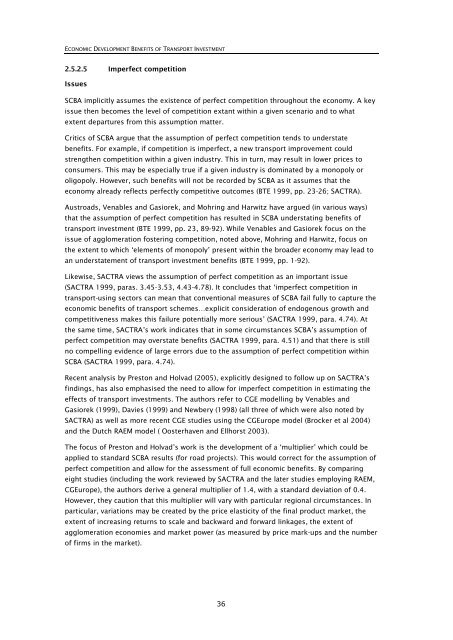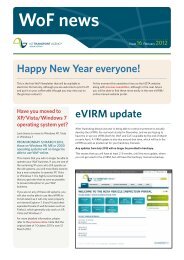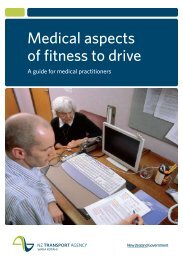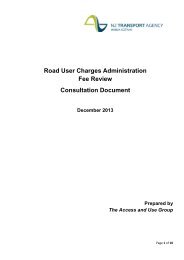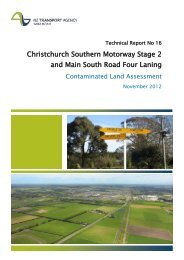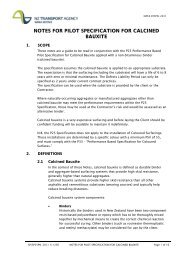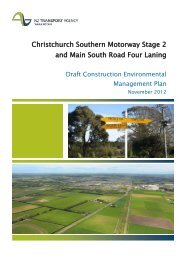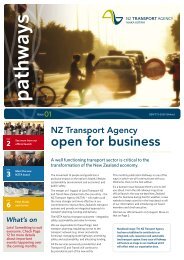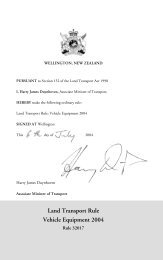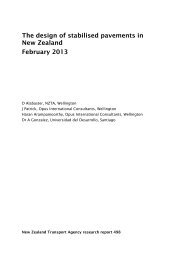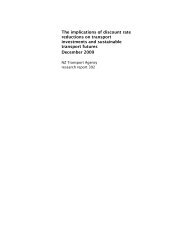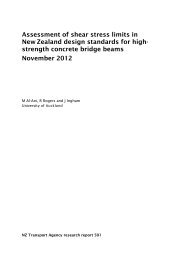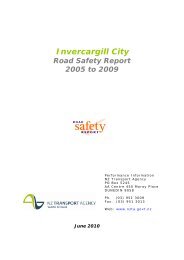Research 350 - NZ Transport Agency
Research 350 - NZ Transport Agency
Research 350 - NZ Transport Agency
Create successful ePaper yourself
Turn your PDF publications into a flip-book with our unique Google optimized e-Paper software.
ECONOMIC DEVELOPMENT BENEFITS OF TRANSPORT INVESTMENT<br />
2.5.2.5 Imperfect competition<br />
Issues<br />
SCBA implicitly assumes the existence of perfect competition throughout the economy. A key<br />
issue then becomes the level of competition extant within a given scenario and to what<br />
extent departures from this assumption matter.<br />
Critics of SCBA argue that the assumption of perfect competition tends to understate<br />
benefits. For example, if competition is imperfect, a new transport improvement could<br />
strengthen competition within a given industry. This in turn, may result in lower prices to<br />
consumers. This may be especially true if a given industry is dominated by a monopoly or<br />
oligopoly. However, such benefits will not be recorded by SCBA as it assumes that the<br />
economy already reflects perfectly competitive outcomes (BTE 1999, pp. 23-26; SACTRA).<br />
Austroads, Venables and Gasiorek, and Mohring and Harwitz have argued (in various ways)<br />
that the assumption of perfect competition has resulted in SCBA understating benefits of<br />
transport investment (BTE 1999, pp. 23, 89-92). While Venables and Gasiorek focus on the<br />
issue of agglomeration fostering competition, noted above, Mohring and Harwitz, focus on<br />
the extent to which ‘elements of monopoly’ present within the broader economy may lead to<br />
an understatement of transport investment benefits (BTE 1999, pp. 1-92).<br />
Likewise, SACTRA views the assumption of perfect competition as an important issue<br />
(SACTRA 1999, paras. 3.45-3.53, 4.43-4.78). It concludes that ‘imperfect competition in<br />
transport-using sectors can mean that conventional measures of SCBA fail fully to capture the<br />
economic benefits of transport schemes…explicit consideration of endogenous growth and<br />
competitiveness makes this failure potentially more serious’ (SACTRA 1999, para. 4.74). At<br />
the same time, SACTRA’s work indicates that in some circumstances SCBA’s assumption of<br />
perfect competition may overstate benefits (SACTRA 1999, para. 4.51) and that there is still<br />
no compelling evidence of large errors due to the assumption of perfect competition within<br />
SCBA (SACTRA 1999, para. 4.74).<br />
Recent analysis by Preston and Holvad (2005), explicitly designed to follow up on SACTRA’s<br />
findings, has also emphasised the need to allow for imperfect competition in estimating the<br />
effects of transport investments. The authors refer to CGE modelling by Venables and<br />
Gasiorek (1999), Davies (1999) and Newbery (1998) (all three of which were also noted by<br />
SACTRA) as well as more recent CGE studies using the CGEurope model (Brocker et al 2004)<br />
and the Dutch RAEM model ( Oosterhaven and Ellhorst 2003).<br />
The focus of Preston and Holvad’s work is the development of a ‘multiplier’ which could be<br />
applied to standard SCBA results (for road projects). This would correct for the assumption of<br />
perfect competition and allow for the assessment of full economic benefits. By comparing<br />
eight studies (including the work reviewed by SACTRA and the later studies employing RAEM,<br />
CGEurope), the authors derive a general multiplier of 1.4, with a standard deviation of 0.4.<br />
However, they caution that this multiplier will vary with particular regional circumstances. In<br />
particular, variations may be created by the price elasticity of the final product market, the<br />
extent of increasing returns to scale and backward and forward linkages, the extent of<br />
agglomeration economies and market power (as measured by price mark-ups and the number<br />
of firms in the market).<br />
36


